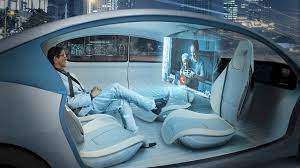Autonomous Cars and their Impact on the Automotive Industry
The automotive industry is going through a major transformation with the emergence of autonomous vehicles. Autonomous cars are vehicles that use a variety of sensors, software, and advanced technologies to operate without any human intervention. These cars are also known as self-driving cars or driverless cars.
Autonomous vehicles are expected to have a significant impact on the automotive industry, transforming the way people travel, reducing accidents, and creating new opportunities for businesses. In this article, we will explore the impact of autonomous cars on the automotive industry.
Reducing Accidents and Improving Safety
One of the most significant advantages of autonomous cars is their potential to reduce accidents on the road. According to the World Health Organization (WHO), around 1.35 million people die each year due to road accidents globally. Autonomous vehicles have the potential to significantly reduce this number by eliminating human error, which is responsible for the majority of road accidents.
Autonomous vehicles use a variety of sensors such as radar, lidar, and cameras to detect objects, pedestrians, and other vehicles on the road. They also use advanced software to analyze the data collected by these sensors and make decisions in real-time. This technology allows autonomous cars to react faster and more accurately than humans, reducing the risk of accidents.
In addition, autonomous cars are also equipped with safety features such as automatic emergency braking, lane departure warning, and adaptive cruise control. These features can help prevent accidents and make driving safer for everyone on the road.

Changing the Way People Travel
Autonomous cars are also expected to change the way people travel. With autonomous vehicles, people can sit back, relax, and let the car do the driving. This will significantly reduce the stress and fatigue associated with driving, making travel more comfortable and enjoyable.
In addition, autonomous cars can also reduce travel time and congestion on the roads. Autonomous cars can communicate with each other and with traffic management systems, allowing them to optimize their routes and avoid traffic jams. This technology can help reduce travel time and make commuting more efficient.
Moreover, autonomous cars can also provide mobility for people who are unable to drive due to age, disability, or other factors. Autonomous vehicles can offer a convenient and affordable alternative to public transport for people who cannot drive themselves.
Creating New Opportunities for Businesses
The Autonomous vehicles are also expected to create new opportunities for businesses. With the emergence of autonomous cars, there will be a growing demand for technologies and services that support autonomous driving.
For example, companies that develop sensors, software, and other technologies for autonomous cars will be in high demand. These companies will play a crucial role in the development of autonomous vehicles and will drive innovation in the automotive industry.
In addition, autonomous cars will also create new opportunities for businesses in the transportation and logistics sector. Autonomous vehicles can help reduce the cost of transportation, making it more affordable for businesses to transport goods and services. This technology can also make logistics more efficient, reducing delivery times and improving customer satisfaction.
The emergence of autonomous cars can also create new opportunities for businesses in the entertainment and leisure industry. With autonomous cars, people can enjoy a variety of entertainment options while traveling, such as watching movies, playing games, or socializing with other passengers. This technology can create new opportunities for businesses to offer innovative entertainment and leisure experiences.
Challenges and Risks
Despite the numerous advantages of autonomous cars, there are also several challenges and risks associated with this technology. One of the major challenges is the regulatory framework. Autonomous cars are subject to complex regulations that vary from country to country. These regulations must be updated to ensure that autonomous vehicles are safe and reliable.
Another challenge is the cost of autonomous technology. Autonomous cars require a variety of sensors, software, and other technologies that can be expensive to develop and maintain. These costs can be a significant barrier to the adoption of autonomous cars, especially for consumers who may not be able to afford the high prices of these vehicles.
Another risk associated with autonomous cars is cybersecurity. Autonomous vehicles rely on software and communication systems to operate, making them vulnerable to cyber-attacks. A cyber-attack on an autonomous car can result in serious consequences, including loss of control, accidents, and even theft of personal data.
Furthermore, there is also a risk that autonomous cars may increase unemployment in certain sectors. For example, the rise of autonomous cars could lead to a decrease in demand for drivers, which could result in job losses.

Conclusion
Autonomous cars are expected to have a significant impact on the automotive industry, transforming the way people travel, reducing accidents, and creating new opportunities for businesses. However, there are also several challenges and risks associated with this technology that need to be addressed.
To ensure the successful adoption of autonomous cars, it is crucial to establish a robust regulatory framework that ensures the safety and reliability of autonomous vehicles. It is also important to address the cost of autonomous technology and ensure that it is accessible to all consumers.
Furthermore, cybersecurity risks must be mitigated to ensure the safety and security of autonomous cars. Finally, it is important to consider the potential impact of autonomous cars on employment and to take steps to ensure that workers are not left behind.
Overall, the emergence of autonomous cars represents an exciting opportunity for the automotive industry to innovate and transform the way we travel. With the right strategies and policies in place, we can ensure that autonomous cars deliver on their promise of safer, more efficient, and more sustainable transportation.
Finally, the implementation of autonomous cars will also require significant investment in infrastructure, including roads and communication systems. Governments and private investors will need to work together to ensure that the necessary infrastructure is in place to support the widespread adoption of autonomous vehicles.
the emergence of autonomous cars is set to revolutionize the automotive industry and transform the way we travel. The benefits of this technology are clear, including increased safety, reduced congestion, and new business opportunities. However, it is important to address the challenges and risks associated with autonomous cars to ensure that this technology delivers on its promise. By working together to develop a robust regulatory framework, address cybersecurity risks, and invest in necessary infrastructure, we can ensure that autonomous cars deliver on their potential to create a safer, more efficient, and more sustainable transportation system for all.














